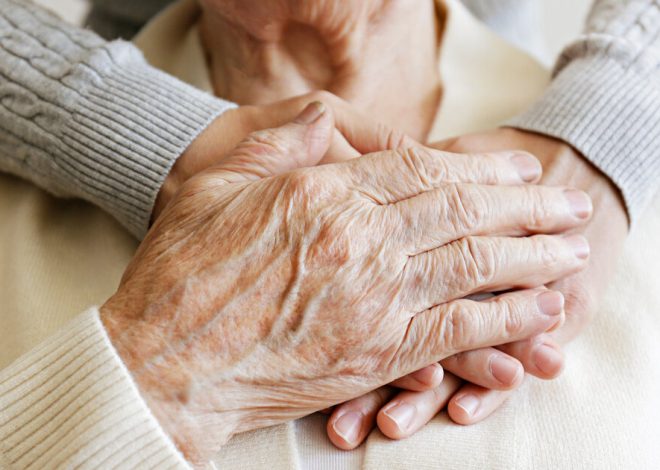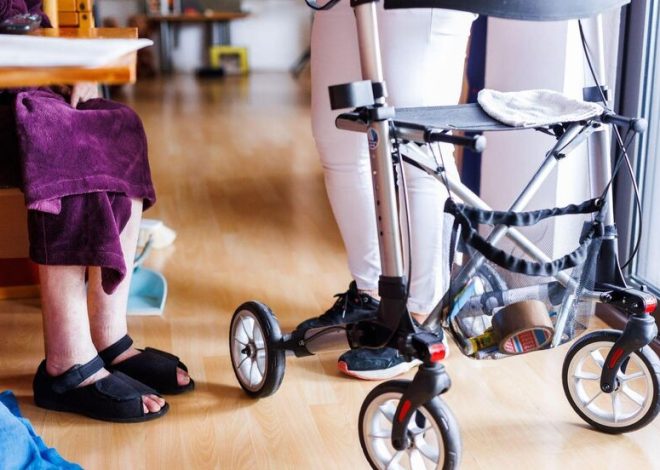
Gelnhausen: High sickness rates in nursing
Main-Kinzig district. There are alarming figures that the Techniker Krankenkasse recently presented: geriatric and nursing staff from Hesse who are insured by TK were on sick leave for an average of almost a month last year. That’s ten days more than in any other professional group. The health insurance company sees the reason for the high sickness rates in the immense workload in nursing.
Read more after Advertisement
Read more after Advertisement
In the Main-Kinzig district, the problem is known in old people’s homes and hospitals. Here too, sickness rates are sometimes high, but the facilities are trying to counteract this.
MKK retirement and care centers: Nursing staff are on sick leave for an average of 25 working days
The elderly and care centers of the Main-Kinzig district (APZ) operate several care facilities in the region, offer over 1,000 care places and employ around 1,100 people. The high level of sickness in nursing is also an issue at the APZ: “The sickness rates vary depending on the facility. On average, they are around 25 working days a year,” reports APZ spokesman Theodor Vasilache.
Read more after Advertisement
Read more after Advertisement
The Main-Kinzig clinics from the hospitals in Gelnhausen and Schlüchtern report similar things. Seasonal fluctuations can be observed, emphasizes nursing director Samuel Palitzsch. But: “Current evaluations show that the sickness rates in our clinics roughly correspond to the national average.”
We do not fully agree with the conclusion that the high levels of sickness absence are due to the workload in nursing
Samuel Palitzsch, nursing director at the Main-Kinzig Clinics
The St. Vinzenz Hospital in Hanau also considers the TK data to be “representative”: “The sickness rates in nursing in our facility are also increased,” says administrative manager Julia Seipp. The same applies to the clinic in Hanau, which says it is also observing a “higher rate of sickness”, although at the clinic this applies across all professional groups and especially compared to the pre-Corona years.
In the assessment, the domestic institutions only share the health insurance company’s conclusions to a limited extent. However, both the APZ and the hospitals are trying to take a differentiated view. APZ spokesman Vasilache says: “The workload is one reason for the high level of sickness. But there are certainly other factors.” Vasilache cites, as examples, the high average age in geriatric care and the physical strain of the job: “In addition, in geriatric care you have to deal with challenging clinical pictures, which can also be stressful.”
Those responsible at the Main-Kinzig clinics also see an interplay of various factors: “We do not fully agree with the conclusion that the high levels of sick leave are due to the workload in nursing,” says Nursing Director Palitzsch. High levels of sick leave are rather the result of a variety of factors, one of which is of course the workload: “But it is not the only reason,” emphasizes Palitzsch.
Read more after Advertisement
Read more after Advertisement
In the Main-Kinzig clinics, experience has shown that seasonal influences in particular have a significant impact on sickness rates: “We have to struggle with various waves of infections until spring, which not only affect our nursing staff, but also throughout the entire community “Reflect the population,” says the nursing director. The causes must therefore be examined in a differentiated manner in order to be able to take appropriate measures.
High sickness rates: workload as a cause? Clinics and nursing homes see it more differently
The Vinzenz Hospital in Hanau also sees the reasons for the sickness absences in a more differentiated way: the TK study showed that working people were generally sick more frequently last year than before Corona. The main reason for this is mainly colds. “In the nursing profession, it should be noted that there is close contact with people who are already sick and in need of protection. Therefore, it is prudent not to go to work if you have a potentially contagious illness, be it a cold or a gastrointestinal virus. Conversely, close contact with people also results in an increased risk of infection. We are also observing increased sickness rates in the other medical professional groups in our company compared to, for example, administrative staff,” reports administrative manager Seipp.
The Hanau Clinic, on the other hand, actually sees the main reason as being the high workload, but this also has its reasons: “We share the health insurance company’s conclusion. Although we have been continuously building up full-time nursing staff for years, the workload continues to increase due to legal and structural requirements and means that in addition to patient care, a number of administrative tasks have to be completed,” says the head of nursing and ward management, Esther Klug .
Those responsible for nursing at home agree that there is still a lot to be done, especially in federal and state politics, to improve working conditions in nursing. An example: “Training must become more attractive and offer more opportunities for specialization. “Nurses have to deal with very different clinical pictures, depending on where they are deployed,” says APZ spokesman Vasilache. And of course the profession needs to be better paid across the board and the nursing staff needs to be relieved through uniform staffing across the country.
Read more after Advertisement
Read more after Advertisement
At the Main-Kinzig Clinics, those responsible would also like to see “profound and visible political efforts” to better take into account the fact that nursing staff are a “quantitatively and qualitatively indispensable part of patient care,” says Nursing Director Paltizsch. This includes, above all, “adequate hospital financing” and relieving nursing staff of additional bureaucratic tasks.
Because of high sickness rates: What clinics and nursing homes are demanding from politicians
Approval comes from the Hanau hospitals: “Hospitals are increasingly getting into economic difficulties. Corresponding reports about hospital bankruptcies or clinic closures naturally unsettle young people, who then turn to other industries,” says Vinzenz administrative manager Seipp. A central factor in making the nursing profession more attractive is support from assistants. However: “It is precisely these auxiliary staff that will no longer be financed through the nursing budget from 2025, which means that hospitals no longer have the guarantee that the auxiliary staff will be fully financed,” criticizes Seipp. The result is that houses in particular that have previously employed an above-average number of assistants will probably have to cut jobs. In addition to the challenges in the health and care system, the expansion of child care and the creation of affordable housing are also important factors.
The institutions do not want to wait for political measures. Instead, the hospitals and retirement homes themselves have developed various ideas and implemented projects to improve the situation in their homes. An example: The APZ have introduced a so-called springer pool so that nursing staff can more easily help out in another facility if necessary. Digital tools could also make a contribution, for example to capture important data in everyday care on a mobile and timely basis. For its nursing staff, the APZ also offers “a variety of offers in company health management as well as training in stress management”.
Make the nursing profession more attractive? The Main-Kinzig clinics can boast impressive figures
The Main-Kinzig clinics also know that it is their own job to “create a good and healthy working environment,” says nursing director Palitzsch. The aim of hospitals is to fill vacancies in nursing in a timely manner through various measures and offers.
Read more after Advertisement
Read more after Advertisement
And apparently with success: “These efforts are bearing fruit. We have been pleased about the increasing number of applicants in nursing for some time now,” reports Palitzsch. “Every month we employ more nursing staff than in the previous month. In the nursing training area, the number of applicants even exceeds the available places several times.”
Flexible time models and as much support as possible: How the facilities want to relieve their nursing staff
An important aspect for the Main-Kinzig clinics is a good work-life balance. For example, flexible working time models would be significantly expanded. There are also various offers as part of company health management at the hospitals in Gelnhausen and Schlüchtern. In addition, a dual nursing course can also be taken up at the Main-Kinzig clinics.
The St. Vinzenz Hospital in Hanau has also been working with a flex pool in nursing for several years: “We can offer our nursing staff individual working time models and deploy them in different wards at the same time,” reports administrative manager Seipp. As a result, numerous new nursing staff have been recruited to the Vinzenz Hospital in recent years: “Some of them have now permanently moved to ward teams, which makes us particularly happy.”
The Hanau hospital also wants to counteract the shortage of skilled workers by increasingly employing skilled workers from abroad: “This of course represents a greater challenge in the first step. Through good induction and the recognition process, we gain important and valuable colleagues,” says Seipp. In addition, the Vinzenz Hospital relies on ward secretariats and service staff on all wards to relieve nursing staff of other tasks.
Read more after Advertisement
Read more after Advertisement
The Hanau Clinic is taking a similar approach: “We train young specialists ourselves and have been continually hiring additional nursing staff for years,” says nursing and ward manager Esther Klug. Service staff are also deployed at the clinic to relieve nursing staff of tasks that are not directly related to medical care. Almost all wards also have medical assistants who provide support with administrative tasks. As an employer, the clinic also offers various health offers to promote the health and well-being of its employees.
GNZ

Ethel Purdy – Medical Blogger & Pharmacist
Bridging the world of wellness and science, Ethel Purdy is a professional voice in healthcare with a passion for sharing knowledge. At 36, she stands at the confluence of medical expertise and the written word, holding a pharmacy degree acquired under the rigorous education systems of Germany and Estonia.
Her pursuit of medicine was fueled by a desire to understand the intricacies of human health and to contribute to the community’s understanding of it. Transitioning seamlessly into the realm of blogging, Ethel has found a platform to demystify complex medical concepts for the everyday reader.
Ethel’s commitment to the world of medicine extends beyond her professional life into a personal commitment to health and wellness. Her hobbies reflect this dedication, often involving research on the latest medical advances, participating in wellness communities, and exploring the vast and varied dimensions of health.
Join Ethel as she distills her pharmaceutical knowledge into accessible wisdom, fostering an environment where science meets lifestyle and everyone is invited to learn. Whether you’re looking for insights into the latest health trends or trustworthy medical advice, Ethel’s blog is your gateway to the nexus of healthcare and daily living.



